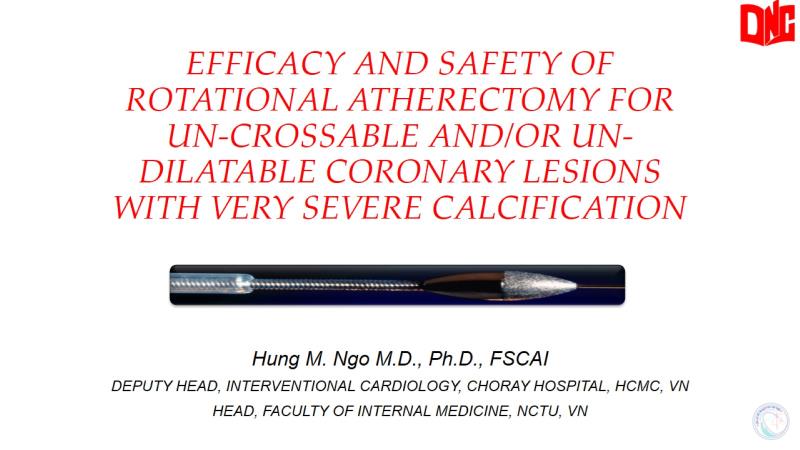- Trang chủ
- Tin tức
Efficacy and Safety of Rotational Atherectomy for un-crossable and/or un-dilatable coronary lesions with very severe calcification

Efficacy and Safety of Rotational Atherectomy for
Un-crossable and/or Un-dilatable Coronary Lesions with Very Severe Calcification
Ngo Minh Hung,
Vo Bui Vinh Tung, Nguyen Van Giap, Nguyen Trung Hau, Nguyen Thuong Nghia
Background: We usually have to accept failure when we can’t cross severely calcified coronary lesions with smallest balloons and/or dilate them sufficiently.
Objects and Method: To examine the safety and efficacy of rotational atherectomy (RA) for un-crossable and/or un-dilatable severely calcified coronary lesions. This is an interventional and prospective study with in-hospital follow-up.
Results: We enrolled 160 patients with mean age 70.10 ± 8.59 (yrs), in which 93 (58.1%) male patients. Lesion Stenosis and lesion length were 90.26 ± 5.90% and 56.13 ± 21.13 mm respectively and calcium classification was 3(+). 1.25mm, 1.5mm and 1.75mm burrs using for ablating are 125 (78.1%), 33 (20.6%) and 2 (1.3%) respectively. RA procedures were successfully performed for 157/160 (98.10%) patients. Mean runs to cross lesions are 4.34 runs with ablating time of 51.28 ± 47.10 (seconds) and at mean speed of 179,836 ± 11,771 rpm. Mean procedure time was 113.27 ± 42,95 mins and mean contrast volume was 175.76 ± 64.76 (ml). There were 3 complicated cases (1 case with severe dissection and 2 cases without any significant progress after ablating for more than 10 mins.
Conclusions: Rotational Atherectomy is safe and effective for un-crossable and/or un-dilatable severely calcified coronary lesions. This technique is highly invasive one, therefore, it should be performed by high volume centers and experienced operators and teams.
Key words: Rotational Atherectomy; un-crossable and/or un-dilatable severely calcified
